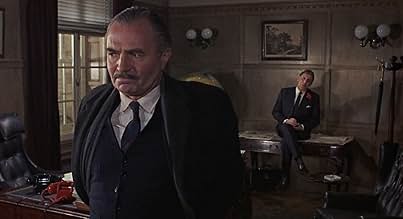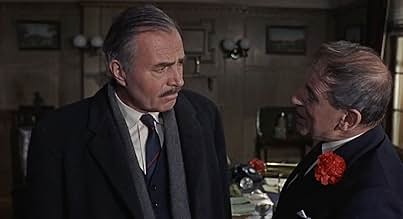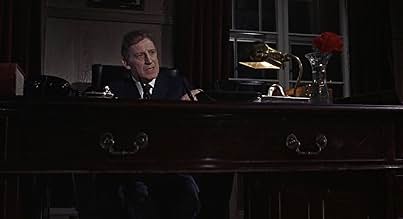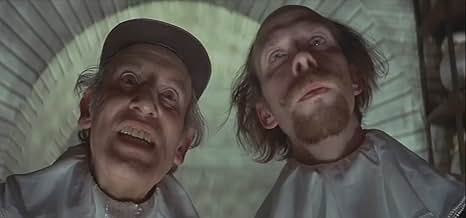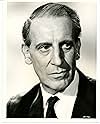Max Adrian(1903-1973)
- Actor
- Soundtrack
Grandiose Irish stage, film and television character player Max Adrian,
a noted classical performer and musical comedy revue star with a highly
distinctive voice and "old school" acting style, was born Guy Thornton Bor on
November 1, 1903, in Kilkenny, County Kilkenny, Ireland. The son of
Edward Norman Cavendish Bor and wife Mabel Lloyd Thornton, Max studied
at the Portora Royal School and showed early interest in the performing
arts. An intermission singer/dancer at a silent film theatre, he made
his stage debut in the chorus in 1925 and proceeded to gain experience
on the West End.
Following extensive repertory experience, Adrian (who was occasionally billed as Max Cavendish) enjoyed his first transcontinental stage hit with "First Episode", which toured throughout England and later transferred to Broadway in 1934. He went on to find wide personal success with his roles in "Troilus and Cressida" and "The Doctor's Dilemma" toward the end of the decade. Joining the Old Vic company in 1939, he scored as "The Dauphin" in "Saint Joan", then continued supremely with John Gielgud's company at the Haymarket Theatre in the mid-1940s as "Puck" in "A Midsummer Night's Dream", "Osric" in "Hamlet" and "Tattle" in "Love for Love".
A founding member of both the Royal Shakespeare Company and, much later, Laurence Olivier's National Theatre, Adrian earned widespread admiration for his work on the lighter side as a singer/comedian on the post-WWII musical revue stage. Many were produced by his long-time companion Laurier Lister (1907-1986). He also later performed eloquently, if outrageously, in one-man shows about George Bernard Shaw and the lesser successful "Gilbert and Sullivan".
Following his revue success, the often-bespectacled actor traveled to America in 1956 to appear in Leonard Bernstein's operetta, "Candide", on Broadway. Adrian stayed and pursued a career working in such summer stock productions of "Pygmalion" as Alfred as Doolittle, "Le Bourgeois Gentilhomme" as "Jourdain", "The Merchant of Venice" as "Shylock", and "The School for Scandal" as "Sir Peter Teazle", but never established a strong footing. He returned to London in 1959 to appear in Noël Coward "Look After Lulu!", which later was taken to Broadway.
In the early 1960s, Adrian became a member of Peter Hall's nascent Royal Shakespeare Company (RSC) in Stratford-upon-Avon, wherein he appeared in "As You Like It", "Twelfth Night" and "Troilus and Cressida", as well as the non-Bard productions of "The Duchess of Malfi", "The Devils" and "The Hollow Crown". He also was a founding member of Olivier's National Theatre Company at the Old Vic from 1963, wherein he supported Peter O'Toole "Hamlet" as "Polonius". He also went on to appear in "Saint Joan", "Uncle Vanya", "The Recruiting Officer" and "The Master Builder".
Less renowned for his work on film, Adrian's made his debut in 1934 with two films: The Primrose Path (1934) and Eight Cylinder Love (1934). Film highlights during this earlier period came with his roles in the historical pieces The Remarkable Mr. Kipps (1941) and Courageous Mr. Penn (1942) and as "The Dauphin" in Olivier's classical masterpiece, Henry V (1944) (aka Henry V). Post-war films included lesser parts in The Taming of Dorothy (1950), Pool of London (1951) and The Pickwick Papers (1952). In later years, he showed some minor flash in Dr. Terror's House of Horrors (1965) and The Deadly Affair (1967), and capped his cinematic career as a favorite actor of visionary director Ken Russell and his mesmerizingly bizarre films The Music Lovers (1971), The Boy Friend (1971) and The Devils (1971). He fared much better on TV with several Shakespearean and other classical roles, notably as a delightful "Fagin" in "Oliver Twist", impressive Benjamin Disraeli in "Victoria Regina", and as composer "Fredrick Delius" in "Song of Summer".
Dying of a heart attack in 1973, the prolific stage actor, survived by his partner, was paid tribute by such luminaries as Laurence Olivier, Alec Guinness and revue co-star Joyce Grenfell.
Following extensive repertory experience, Adrian (who was occasionally billed as Max Cavendish) enjoyed his first transcontinental stage hit with "First Episode", which toured throughout England and later transferred to Broadway in 1934. He went on to find wide personal success with his roles in "Troilus and Cressida" and "The Doctor's Dilemma" toward the end of the decade. Joining the Old Vic company in 1939, he scored as "The Dauphin" in "Saint Joan", then continued supremely with John Gielgud's company at the Haymarket Theatre in the mid-1940s as "Puck" in "A Midsummer Night's Dream", "Osric" in "Hamlet" and "Tattle" in "Love for Love".
A founding member of both the Royal Shakespeare Company and, much later, Laurence Olivier's National Theatre, Adrian earned widespread admiration for his work on the lighter side as a singer/comedian on the post-WWII musical revue stage. Many were produced by his long-time companion Laurier Lister (1907-1986). He also later performed eloquently, if outrageously, in one-man shows about George Bernard Shaw and the lesser successful "Gilbert and Sullivan".
Following his revue success, the often-bespectacled actor traveled to America in 1956 to appear in Leonard Bernstein's operetta, "Candide", on Broadway. Adrian stayed and pursued a career working in such summer stock productions of "Pygmalion" as Alfred as Doolittle, "Le Bourgeois Gentilhomme" as "Jourdain", "The Merchant of Venice" as "Shylock", and "The School for Scandal" as "Sir Peter Teazle", but never established a strong footing. He returned to London in 1959 to appear in Noël Coward "Look After Lulu!", which later was taken to Broadway.
In the early 1960s, Adrian became a member of Peter Hall's nascent Royal Shakespeare Company (RSC) in Stratford-upon-Avon, wherein he appeared in "As You Like It", "Twelfth Night" and "Troilus and Cressida", as well as the non-Bard productions of "The Duchess of Malfi", "The Devils" and "The Hollow Crown". He also was a founding member of Olivier's National Theatre Company at the Old Vic from 1963, wherein he supported Peter O'Toole "Hamlet" as "Polonius". He also went on to appear in "Saint Joan", "Uncle Vanya", "The Recruiting Officer" and "The Master Builder".
Less renowned for his work on film, Adrian's made his debut in 1934 with two films: The Primrose Path (1934) and Eight Cylinder Love (1934). Film highlights during this earlier period came with his roles in the historical pieces The Remarkable Mr. Kipps (1941) and Courageous Mr. Penn (1942) and as "The Dauphin" in Olivier's classical masterpiece, Henry V (1944) (aka Henry V). Post-war films included lesser parts in The Taming of Dorothy (1950), Pool of London (1951) and The Pickwick Papers (1952). In later years, he showed some minor flash in Dr. Terror's House of Horrors (1965) and The Deadly Affair (1967), and capped his cinematic career as a favorite actor of visionary director Ken Russell and his mesmerizingly bizarre films The Music Lovers (1971), The Boy Friend (1971) and The Devils (1971). He fared much better on TV with several Shakespearean and other classical roles, notably as a delightful "Fagin" in "Oliver Twist", impressive Benjamin Disraeli in "Victoria Regina", and as composer "Fredrick Delius" in "Song of Summer".
Dying of a heart attack in 1973, the prolific stage actor, survived by his partner, was paid tribute by such luminaries as Laurence Olivier, Alec Guinness and revue co-star Joyce Grenfell.


